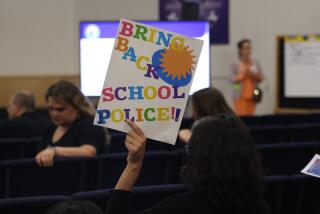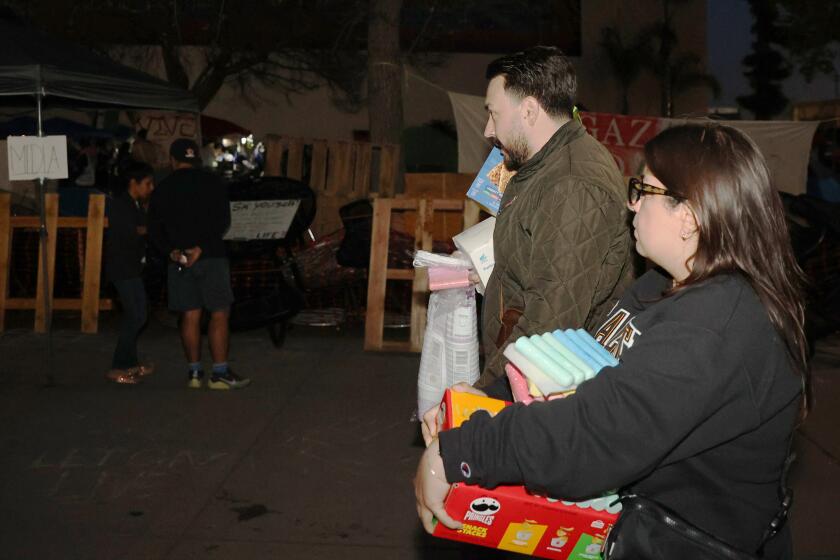Boost for College-Bound
It’s a giant leap from Compton High to Harvard University, but Leslie Jimenez is eager to get started as a freshman at the venerable Ivy League school this September.
Julio Gomez and Berhane Azage -- recent graduates of South Los Angeles public high schools who are heading, respectively, to Dartmouth and Stanford -- feel much the same way.
But these students, like others from urban high schools that send few graduates to four-year colleges, also harbor self-doubt: Can they make the transition from tough, low-income Los Angeles neighborhoods to the nation’s best universities? Will their academic skills, particularly their writing, measure up?
“I’ve always been a good student, but I don’t come from the best school, so I don’t know how prepared I am,” said Gomez, 17, a Locke High graduate. “That kind of scares me a little bit.”
To improve their prospects, Jimenez, Gomez and Azage have been participating in a USC initiative to help such talented teenagers jump to academia’s top rungs. The program also is designed as a research project to find out how much of a boost such an eleventh-hour course emphasizing writing can provide. The four weeks of classes end today, but USC researchers will track the participants’ grades in college this coming school year.
The 25 students offer a glimpse of the tenacity propelling them to University of California campuses or highly ranked private universities. Some have lived on violence-plagued streets where they were ridiculed for taking school seriously. And many come from minority and immigrant families with parents struggling to make ends meet.
“Many of them are the first in their families to go to a university, so the families’ eyes are on them,” said William “Memo” Arce, a graduate student in English at USC who is one of the summer program’s two writing instructors. “They made it out of the neighborhoods; will they make it through the university?”
Edward Lamotte, the program’s one student enrolling at USC in the fall, said part of his motivation for working hard in school was “to not make the same mistakes” that lured some relatives and friends into gangs. He said his aim was “to change the cycle.”
Lamotte, the youngest of six children and the first to attend a four-year college, said he also was inspired by his widowed Mexican-immigrant mother. She works as a custodian at USC during the week and as a hotel housekeeper on the weekend. Lamotte, who is considering majoring in business, said his mother “always believed in me ... [and] I guess seeing her work so hard always made me feel that whatever I was going through wasn’t going to be quite as hard.”
Gomez, who wants to major in political science or cultural anthropology and then join the Peace Corps, said studious youngsters in his South Los Angeles neighborhood are often “seen as the nerdy kids or whatever, and there’s a bit of a stigma.” Gomez says he enjoys his new friends in the USC program, especially because “in the schools I come from, it’s not as common to find someone who you can relate to as much.”
Evelyn Avila, who is heading to UC Santa Cruz, provides another example of the students’ grit. After the USC class, she takes a bus to the San Fernando Valley to work afternoons at her family’s printing business, and then gets a ride from one of her parents to East Los Angeles Community College for an evening sociology class.
“I know that my weakest skill is English,” said Avila, who spent part of her early childhood in Mexico and speaks Spanish at home in Boyle Heights with her immigrant parents.
Avila said that she was humiliated in elementary school because of her poor English and that she struggled academically until high school. Teachers, she said, regarded her as a “you’re never going to do anything with your life” type. In high school at Francisco Bravo Medical Magnet High, she turned her performance around and earned mostly A’s. She plans to study sociology and become an immigrant rights lawyer.
The USC course is the brainchild of William G. Tierney, director of USC’s Center for Higher Education Policy Analysis.
Spurred by research showing that, on average, Latino and black students lag their classmates at elite colleges, Tierney revamped an existing USC enrichment program. His main innovation was devoting four weeks mainly to writing and critical reading, while including sessions on such topics as financial aid and “10 ways to impress your professors.” His goal is to develop a more intensively academic program that will show clear benefits and can be duplicated by other colleges.
“You have to be able to do college reading and writing,” Tierney said. “These students, although they may have been first in their class wherever they went to school, when they go off to elite institutions, they have problems above and beyond the usual freshman transitioning to college. What we’re trying to do is prepare these kids as well as possible.”
Eugene M. Tobin, former president of Hamilton College and an expert on educational opportunity for the Mellon Foundation, noted that since the late 1960s a wide array of college-preparation programs have sprung up across the country to help disadvantaged youths.
But, he said, evidence of the benefits of these programs is largely anecdotal. As a result, Tobin said, he welcomed Tierney’s plans to track the students’ performance. USC researchers intend to compare the participants’ grades in their freshman year -- a time when students are at high risk of dropping out -- with those of college classmates from similar backgrounds who haven’t been in such programs.
Nearly all of the students in Tierney’s project are Latino, black or Asian, and are to receive substantial financial aid to attend college. They were recruited from heavily minority high schools in the Los Angeles area. They have attended the summer classes for free, with costs covered mainly by a $25,000 grant from the Educational Loan Foundation of California.
Called “Write On! SummerTIME,” the program provided 3 1/2 hours of instruction and discussion every morning, along with several hours more of outside writing and reading assignments. The course emphasized topics that affect the students’ lives. Recently they wrote papers on urban youth and violence.
Lamotte, who said he had his jaw broken a year ago when he was jumped by three classmates at Bravo, said the topics touched him personally.
“It makes you, when you’re writing, take a little bit more time because it’s almost like you’re suggesting a solution to your own problem,” he said.
The students’ familiarity with urban life was evident when they took a field trip to Boyle Heights’ Homeboy Industries, which hires former gang members. Avila thanked the organization’s founder, Father Gregory J. Boyle, for helping steer her next-door neighbor away from trouble.
Arce and Jennifer Kwon Dobbs, the other writing instructor, say it’s rewarding to teach these students in part because they are so demanding and take their education so seriously.
Dobbs said so many of the students have asked her to take an extra look at their drafts that, sometimes, “I have to tell students I don’t have time to see their papers because they want to keep revising and revising and revising.”
Jimenez was one of the first to ask for the extra evaluation.
Dobbs quickly spotted that Jimenez tended to use casual language when more formal terms were necessary. “She would say, ‘money-hungry society’ as opposed to, say, ‘consumerist attitudes.’ The difference between the two is that ‘consumerist attitudes’ allows her to tap into research. If she plugged ‘money-hungry society’ as the keyword into a search engine, she wouldn’t get much” on the Internet, Dobbs said.
Likewise, Dobbs said that in another draft, Jimenez mentioned “cops eating doughnuts,” rather than discussing their “work ethic.”
“It was a matter of her simply not knowing how else to say it,” Dobbs said.
Jimenez, a daughter of Mexican immigrants who was salutatorian of her high school class and who scored 1180 out of 1600 on the SAT, said she “knew I had to work on my writing. I just wasn’t sure what my true weaknesses were.”
Jimenez, who hopes to study biology and become a veterinarian, is the third-eldest child out of four in her family and the first to attend college. Her father is a truck driver, and her mother, now disabled, sewed uniforms at a garment factory.
Stanford-bound Azage arrived in Los Angeles from Ethiopia 2 1/2 years ago. Azage’s father has worked intermittently as a security guard, and his mother has been a nursing assistant and, recently, a housekeeper.
He is one of the most accomplished students in the class and earned 1510 on his SATs. Yet Tierney, who has included Azage’s experiences in a book coming out later this year titled “Urban High School Students and the Challenge of Access,” said the 17-year-old needed help with his writing too.
Tierney said Azage, as a nonnative English speaker whose first tongue was the Ethiopian language of Amharic, still makes some grammatical errors and also has had to work to break away from a “florid, long-winded writing style” ill-suited for academic papers.
The USC course, Azage said, wasn’t long enough to make a dramatic difference, but “it has made me a bit more confident than I was about my writing.”
Azage, who plans to study electrical engineering and international relations at Stanford, said no one should judge him by stereotypes about his South Los Angeles neighborhood. “There are people who come out of these areas who are making huge impacts in the world, and I wanted to be one of them as well.”
More to Read
Start your day right
Sign up for Essential California for news, features and recommendations from the L.A. Times and beyond in your inbox six days a week.
You may occasionally receive promotional content from the Los Angeles Times.






